- Home
- Christopher Moore
Shakespeare for Squirrels Page 2
Shakespeare for Squirrels Read online
Page 2
“Hark!” said I, stepping into the clearing and waving my puppet stick in a grand flourish. “What pathetic creature cries out for mercy to end its consumptive suffering?” The five turned to regard me.
“It is I,” said a tall fellow of perhaps thirty summers like myself. “Snug, the joiner. I play a lion.”
“Who are you?” said a younger fellow, just coming into his beard, who, strangely enough, wore a woman’s veil with his tradesman’s togs.
“I am Pocket of Dog Snogging,” said I, with great pomp. “Called the black fool.”
“He’s tiny,” said a balding fellow on the end.
“I think he is an elf,” said the director of the troupe, a sturdy fellow with a headful of curls going gray. I noted his position because he carried a scroll.
“But it is daytime,” said a third, a curly-haired fellow a few years my senior, dressed as roughly as the others except for a finely woven waistcoat. “The people of the wood are not about in the day.”
“The Puck goes about in the day,” said Snug, who would be a lion.
“Speak there, traveler,” said a fourth fellow, tall, thin, and long of foot, wearing a hat of poorly tanned doeskin so that the earflaps, meant to be tied under the chin, jutted into the air like the ears of a confused hare. “Are you wood folk or town folk?”
“Throw him a sock, Francis,” said the director. “I heard that elfs can’t resist picking up a sock.”
The young bloke in the veil quickly pulled off a shoe and tossed a dirty sock at my feet. “There you go.”
“Not an elf,” said I.
“But he’s so tiny,” said the bald fellow, who was unwittingly close to having his brains scrambled by a sharp blow from a puppet stick.
It is fair, I suppose, to say that I am not a large fellow. In fact, while not actually tiny, I am fetchingly compact of structure. Not twisted of limb nor truncated of torso like some troll, but, in fact, composed with fearful symmetry—like the swiftest of horsemen—the very picture of perfection, if you imagine you are seeing me from farther away, and then there’s a pleasant surprise when I arrive before you expected.
“Pardon my cohort, good sir,” said the fellow in the fine waistcoat. “Clearly you are a gentleman of distinction and skill.” He gestured frantically to the others at my motley and puppet stick. “A player.”
“I am a fool by training,” said I. Under normal circumstances I might have punctuated the announcement of my trade with a backflip or a bit of juggling, but I was still weak with hunger and light-headed from my injury.
“And I am Nick Bottom, the weaver,” said he, explaining the fine waistcoat with a word. “We are players ourselves. A company newly formed to perform an amusement for the duke’s wedding, four days hence.”
“The Mechanicals!” announced the director. They all clicked their heels and bowed.
“So a bit of Greek drama, is it?” said the puppet Jones in a smaller version of my voice. “The old ‘kill your da, shag your mum, and blind yourself before the final curtain’?”
“No,” said Bottom. “We shall perform the most laughable tragedy and comic travesty of Pyramus and Frisby.”
“Thisby,” corrected the fellow with the scroll.
“Pyramus and Thisby,” said Bottom. “Now, each man step forward as I call his name and present dignity and persona dramatic for this master lesbian, who can be identified as thus by his garments and puppet.”
“Actually—” I began, but the players had lined up and Bottom proceeded.
“Peter Quince, the carpenter, step forward.”
The graying fellow I thought the director stepped up with his scroll. “I present the chorus, a narrator and teller of prologues, epilogues, and assorted expositions; also the father of Pyramus.” He bowed.
“Do not bow,” said Bottom. “You have done nothing yet. Now, Snout.”
The tall fellow with the ridiculous doeskin hat came forth. “Tom Snout, tinker. I present Thisby’s mother. Also wall.” He curtsied.
“Don’t curtsy,” said Bottom.
“No?” said Snout, an ersatz bunny ear raised in curiosity.
“Unprofessional,” explained Peter Quince, the director and carpenter.
“Sorry,” said Snout, who curtsied and backed away.
“Wall?” I asked.
Drawing figures in the air, Bottom said, “Pyramus, a brave and manly hero, and Thisby—”
“Most beautiful maid,” said the young one, tittering behind his veil. “I am Francis Flute, bellows mender.” He curtsied.
“Pyramus and Thisby are lovers,” said Bottom. “Most unapproved lovers of two feuding families, whose houses share a wall. Forbidden to see each other, the lovers perpetrate their romance through a cranny in a wall.”
“Presenting wall,” said Stupid Hat, with a curtsy. He held out his fingers in a loop to present the aforementioned cranny in the wall. “Presenting cranny.”
“So the lovers have each other off through a chink in the wall?” I inquired.
“A fanciful romance to be sure,” said Bottom, “but more suited to Snout’s talents than a dragon, which was the other story we had. But the lovers will but whisper and fling soft woo through the chink.”
“Well that won’t do, they’ll need to chip the cranny out a bit wider, and do a bit of balancing on chairs,” said I. “But once done, a dramatic and credible wall bonking will surely make the show.”
“Oh, bravo!” said Peter Quince. And they all clapped politely.
“Oh, good sir,” said Bottom. “I knew as soon as I saw your fool’s motley you would bring skill and grand disaster to our play.”
“Indeed,” said I. “I will lend thee my mastery of stagecraft and verse when my strength returns.” I looked about for any sign of food and spied a pile of rucksacks by a large boulder. “I will need the help of my apprentice, and as we have been traveling, any food and drink you might have.”
“Yes,” said Peter Quince. “Right here.” He waved toward the rucksacks.
“Drool,” I called. “Come out, please, and meet—”
“Hello,” said the dim giant as he trudged out of the brush. The Mechanicals were awed. Stupid Hat gasped at Drool’s sheer taurine enormity. Drool approximated the size of two well-fed men-at-arms stuffed haphazardly into a single skin without leaving room for a full serving of brains.
“Zounds,” said the bald one. “He’s fucking huge.”
“Well observed,” said I.
“Well, why then are you so small?” said the shiny-pated toss-bobbin.
“You are an elf, aren’t you?” said Peter Quince. “Francis, throw him another sock.”
“I don’t have another sock,” said the boy with the veil.
Quince winced. “You only wore one sock?”
“I didn’t know there was going to be a bloody elf test,” said the lad.
“I have a sock,” said Snug the lion, revealing a vacant grin as he held up a tattered woolen sock.
Bottom said, “Snug, why is your sock not in your shoe with your foot?”
“I was afraid I was going to be late. I thought I would put it on when I got here.”
I turned to address my apprentice. “Drool, we have at last found your tribe. Gentlemen, this is Drool, apprentice fool and onetime minister of wank to the lands of England, France, Burgundy, Brittany, Belgium, and sometimes Spain.”
“Charmed,” said Drool, reaching down the front of his canvas sailor’s trousers to give a demonstration.
“Perhaps just a bow, lad,” I instructed.
“Pleased to be of your acquaintance,” said Drool, offering his hand to the bald fellow.
“Robin Starveling,” said baldy as he backed away, hiding his own hand behind his back. “Tailor.”
“Well,” said I. “Now that we are all mates in the service of the stage, why don’t you show us to the food, and while Drool and I refresh ourselves, you gents can run through your lines and I will give keen and critical review? Drool can load a
great battery of gas he can set alight at intermission.”
“I’m not giving up my lunch to another thieving elf,” said Robin Starveling.
“Still not an elf,” said I.
“Aye, can’t trust an elf far as you can throw them,” said Snout (Stupid Hat) the tinker. “Rascals every one.”
“The last one stole my best hat and touched up my wife by the millpond,” said Snug the joiner. “She’s been useless for wifely duties ever since.”
“Begging pardon, sirrah,” said Bottom, doffing his hat. “Some in our troupe have been much abused by one of the wood folk, a jester as well, called Robin Goodfellow.”
“The Puck,” said Quince. “Said he’d teach us a fashionable dance to do for the duke. Took our coin, then buggered off to who-knows-where, leaving us fuck-all for our trouble.”
“The rascal,” said I. I exchanged a look of flabbergast with the puppet Jones. Truth told, until that moment, I had thought I, too, might bugger off to parts unknown, leaving them with fuck-all for their trouble, but now I felt honor-bound to mend the reputation of my fellow fool and rascal. There are so few of us, after all, subject as we are to being hanged by humorless royals. “That’s in violation of the fool’s code. I shall make good on the Puck’s promise and teach you all a jaunty dance. After lunch.”
“We don’t need a dance now,” said Francis Flute, au falsetto behind his veil. “We’ve Thisby and Pyramus to carry the day.”
“Gentlemen,” said Bottom, as he rifled through the rucksacks, drawing out bread, fruit, cheese, and various basketed jugs as he went and placing them on a shawl he’d spread out on the ground. “Let us allow our professors to regain their strength. I fear the romantic bombast of my Pyramus may otherwise overwhelm their sensibilities.”
“Proceed, gentlemen,” I said, as Drool and I fell upon the Mechanicals’ lunch like wolves on the fold.
Peter Quince, carpenter and director, stepped forward. “Now am I the chorus.”
“Pray continue,” I said around a mouthful of coarse brown bread.
Quince unrolled his scroll. “Two households, both alike in dignity—”
“Rawr,” said Snug, the tall fellow.
“Now is not the time to roar,” said Quince. “I have not yet warned the ladies not to be afraid.”
“Rawr,” repeated Snug.
“No one will be afraid,” said I.
“I shall wear a mane made of straw, and paint my jaws with the blood,” said Snug.
“Do it again,” said I, snatching a plum from our hoard and skipping to the lion’s side.
“Rawr,” said Snug.
“Pathetic. You have to summon the full wind and throat of the beast, lad, not simply say ‘rawr.’ Call up an echo from your memory, then let it roar from time’s ear to today’s lips. Hear the beast, be the beast.”
“Hear the beast, be the beast,” said Drool, note for note in my voice, which is the ninny’s peculiar talent. It’s bloody unsettling at times.
The Mechanicals stared in wide wonder at Drool.
“Like that,” said I. “Make the sound you have heard a lion make.”
“I’ve never seen a lion,” said Snug.
“Well, extrapolate your roar from such fierce creatures as you have seen.”
“I’ve seen a chicken,” said Snug.
The knot on my brow suddenly began to throb and I pushed my coxcomb back to relieve the pressure.
“I believe I could improvise the most terrifying of chicken roars,” said Nick Bottom. “If I may have a go.”
“No!” said I. “There will be no roaring chickens. What ferociousness-deprived land is this? Have you no bears, no wolves, the odd fox with a cough—no wild beast from which to draw your inspiration?”
“We might,” said Snug, “but they aren’t about in daytime, and none of the town folk go into the forest at night, only the wood folk.”
“That is true,” said Bottom.
“Oh fuckstockings!” said I. Why had I not offered a song for our meal, perhaps a threat? I looked to Drool, who had laid waste to much of the tradesmen’s lunch. We could dash now, I supposed, and leave them to their roaring chickens and wall shagging.
“I have seen a goat as well,” said Snug, with more pride than goat-spotting generally merits. “Many goats.”
“Perhaps a different approach.” I reached up to Snug to bring him into my confidence, thought to put my arm around his shoulders, but he was so tree-fuckingly tall I ended up accidentally clouting him on the back of the head, knocking his cap to the ground.
“Hey!” said the hapless joiner.
“There you have it,” said I. “If you have not heard a ferocious creature you must summon it in yourself. Now, think of when that rascal Puck had his way with your wife.”
“He only just touched her up, he—”
“Roar, player! He ruined her forever! Used her like a common tramp while the whole village watched.”
“But—”
“Roar!” I clouted him on the back of the head again for good measure.
“RAWR!” roared Snug, with great improvement, surprising himself and startling Drool so that he aspirated a bit of the sweet wine he was quaffing.
“Oh, well done,” said Bottom. “Bravo, good Snug.” He clapped politely and the rest of the Mechanicals joined in.
Snug smiled shyly and bowed his head. “If I were a lion I would bite the neck of that rascal Puck.”
“Your ire serves you well,” said I. “Gentlemen, shall we progress to actual lines from the text?”
“Who roars there?” came a voice from the edge of the clearing. I looked to see a large, scruffy fellow dressed in leather armor and trailing a sword at his waist, followed by a smaller bloke in black aiming a crossbow, loaded and drawn, upon poor Snug.
“Blacktooth,” whispered Bottom. “Captain of the watch.”
Chapter 3
The Watch
The captain of the watch, Blacktooth, was the sort of beetle-browed brute I’d encountered my whole life at the fringes of royal courts: large men whose talent for violence and incapacity for original thought carried them into middling positions as enforcers, jailers, and executioners. There had been a dozen or so of that stripe on the pirate ship, and if not for my own wary quickness with a blade or fear of Captain Jessica’s vengeance (she’d once dirked a fellow pirate in the dick for touching her bottom sans consent) I’m sure I would have been pummeled and cast broken into the sea long before we were set adrift. ’Tis best to proceed with caution when confronted by such slow-witted, quick-tempered creatures, particularly when they are backed by a ferrety second with a cocked crossbow.
“Bow to your betters, thou chicken-witted catch-farts!” exclaimed the puppet Jones, much to my surprise, because I had not thrown my voice nor worked the ring and string that move his mouth, which, generally, is how the puppet makes his point.
The ferrety watchman raised his crossbow and aimed at my chest. I dropped Jones and dove behind the thespians as I drew one of the daggers from the small of my back. Once I heard the bolt fly I might close enough distance between myself and the watchmen to send a dagger at the big one before his sword could clear its scabbard. There’d be an instant while the smaller one tried to reload, and I could send a second dagger to his throat. The big one would still be staggering, my slim blade a bloody brooch in his breast, but with good fortune, Drool could help me bring them both to a swift finish. (I am not a fighter by nature, and spent much of my time during pirate raids in the rigging shouting encouragement to my mates and withering insults at the enemy, but Drool, if you caught him between wanks and snacks, could summon great strength and fury when the dashing of brains needed to be done.)
I came to my feet, leapt, then launched myself off the shoulders of Snout the bunny-hatted tinker—a vault I hoped would put me in knife-throwing range of the watchmen. But alas, no bolt was loosed, and as I somersaulted, I saw the captain pushing his cohort’s crossbow down. I landed lightly, and light-h
eaded, not twenty feet in front of them. I shook off my dizziness and went to one knee with a theatrical flourish, fitting my dagger back into its sheath as I bowed.
“Gentlemen!” said I. “Good day to you, and greetings from our humble troupe of players, the Mechanicals!”
“The Mechanicals!” repeated the players (may all the errant gods bless them). They bowed in a rough approximation of unison.
The captain scowled at the archer. “Burke, we of the watch do not shoot a man for sporting an impotent puppet.”
“Impudent,” corrected Burke.
Blacktooth then turned to us, doffed his bronze officer’s helmet, which looked like it might have been used recently for boiling beans, and said, “Beggin’ your pardon, gents, Burke is under training these two years and is yet a nematode in the ways of the watch.”
“Neophyte,” corrected Burke.
“Take the shot, ya scurvy coward,” said the puppet Jones from his spot lying in the dirt. “Or haven’t you the stones for a fight?”
How? It was my smaller voice but not from me. Drool, perhaps . . . “Drool, stop that!” I called.
The great ninny opened his mouth and an avalanche of half-chewed bread tumbled down his front. Not Drool. What trickery was this?
Then four more watchmen with spears stepped out of the wood and the notion of a fight or escape sizzled like a butterfly in a firestorm.
“Halt!” said the captain. The watchmen stopped. Blacktooth turned and stepped up to me—loomed, as it were.
The ferrety archer slung his crossbow onto his back by a leather strap and scampered past me. “Show your passports, citizens,” he commanded.
Each of the Mechanicals produced a wooden chit from his pocket or from a lanyard around his neck, each chit bearing a wax seal and burnt inscription of some sort.
Burke read aloud from each chit before moving to the next. “Peter Quince, Joiner’s Guild. Nick Bottom, Weaver’s Guild. Francis Flute, Bellows Mender’s Guild.”
“You have enough broken bellows to support a guild of menders?” I asked Flute.
“There’s just me and another fellow,” said Flute from the modesty of his veil.

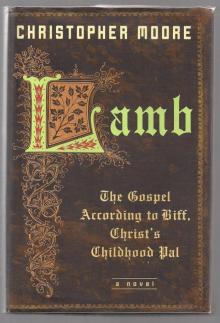 Lamb: The Gospel According to Biff, Christs Childhood Pal
Lamb: The Gospel According to Biff, Christs Childhood Pal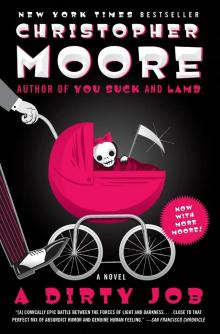 A Dirty Job
A Dirty Job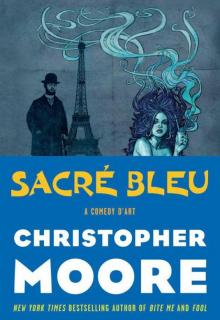 Sacré Bleu
Sacré Bleu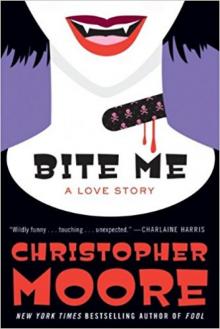 Bite Me: A Love Story
Bite Me: A Love Story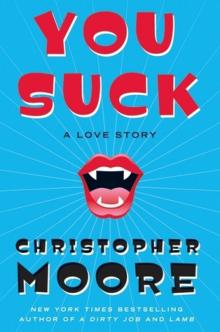 You Suck: A Love Story
You Suck: A Love Story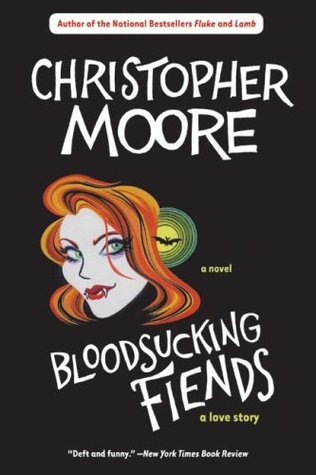 Bloodsucking Fiends: A Love Story
Bloodsucking Fiends: A Love Story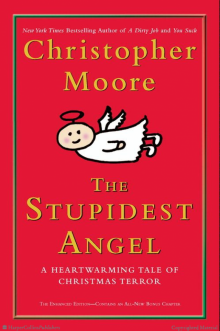 The Stupidest Angel
The Stupidest Angel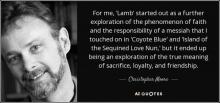 Coyote Blue
Coyote Blue The Lust Lizard of Melancholy Cove
The Lust Lizard of Melancholy Cove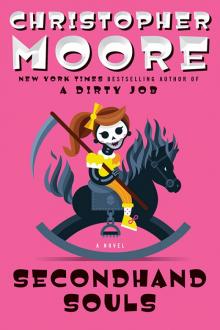 Secondhand Souls
Secondhand Souls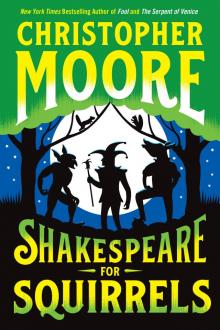 Shakespeare for Squirrels
Shakespeare for Squirrels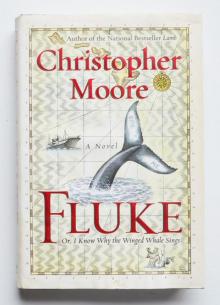 Fluke, or, I Know Why the Winged Whale Sings
Fluke, or, I Know Why the Winged Whale Sings Island of the Sequined Love Nun
Island of the Sequined Love Nun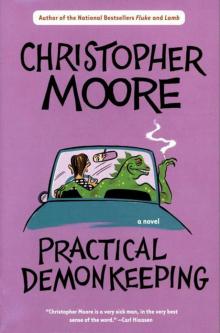 Practical Demonkeeping
Practical Demonkeeping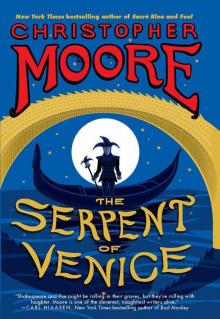 The Serpent of Venice
The Serpent of Venice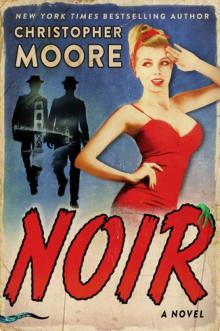 Noir
Noir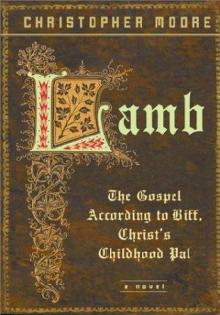 Lamb: The Gospel According to Biff, Christ’s Childhood Pal
Lamb: The Gospel According to Biff, Christ’s Childhood Pal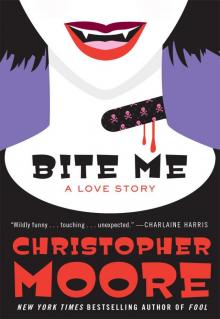 Bite Me
Bite Me Bloodsucking Fiends
Bloodsucking Fiends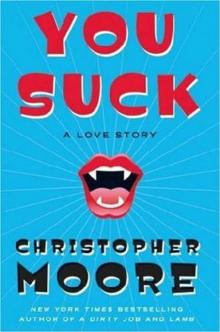 You Suck ls-2
You Suck ls-2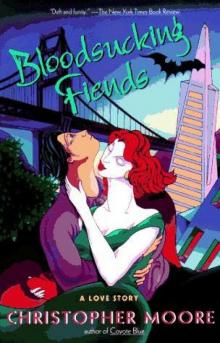 Bloodsucking Fiends ls-1
Bloodsucking Fiends ls-1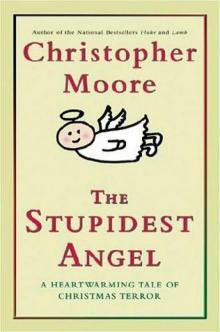 The Stupidest Angel: A Heartwarming Tale of Christmas Terror
The Stupidest Angel: A Heartwarming Tale of Christmas Terror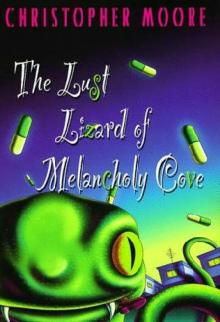 The Lust Lizard of Melancholy Cove pc-2
The Lust Lizard of Melancholy Cove pc-2 You Suck
You Suck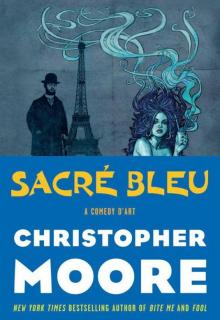 Sacre Bleu: A Comedy d'Art
Sacre Bleu: A Comedy d'Art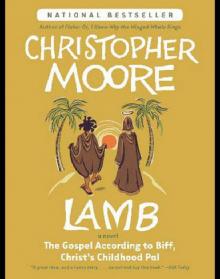 Lamb
Lamb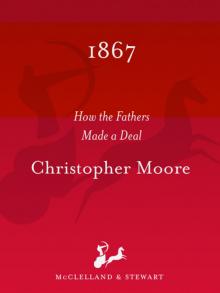 1867
1867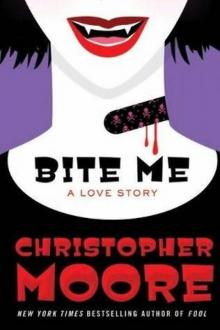 Bite Me ls-3
Bite Me ls-3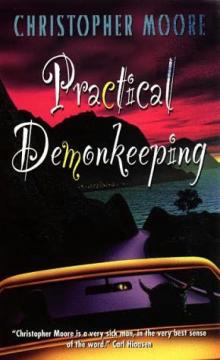 Practical Demonkeeping pc-1
Practical Demonkeeping pc-1